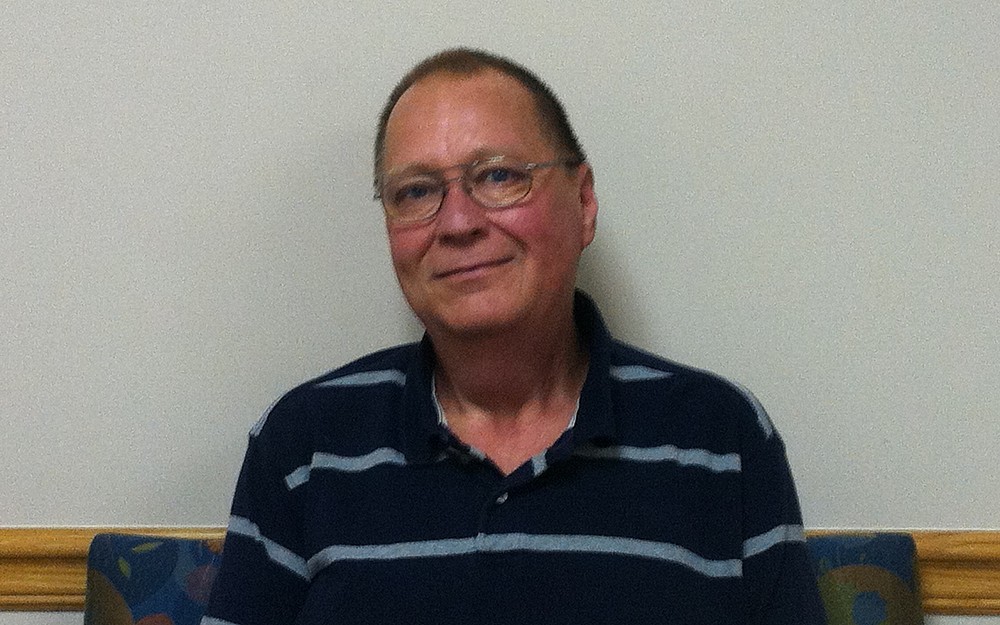
Stage-3 Esophagus Cancer Discovered After Heart Attack
A few weeks after having a stent placed as a result of a heart attack, James Adams, 54, of Independence, Ky., began having trouble swallowing.
"I have acid reflux, but when they went in to stretch my throat they found cancer, he recalls. In February 2011, Adams was diagnosed with stage-3 esophagus cancer that had spread to the lymph nodes.
"I was dumbfounded. I didnt know what to do, who to talk to it was overwhelming, says Adams. "Everyone at UC Health has been excellent. Its been a long road to get rid of the cancer and, frankly, I think it was even scarier to my family than me.
As he began an aggressive regimen of chemotherapy followed by radiation, he was referred to Sandra Starnes, MD, a UC Health thoracic surgeon and chief of the thoracic surgery at the UC College of Medicine, to discuss surgical options.
Starnes suggested a three-hole esophagectomy to fully remove the cancer. Its a big procedurerequiring incisions in the neck, chest and abdomen and typically six to eight hours in the operating roombut necessary to address larger tumors in this difficult-to-reach part of the body. Starnes performed the surgery collaboratively with Jeffrey Sussman, MD, a UC Health surgical oncologist and surgical oncology division chief at the UC College of Medicine.
The goal of an esophagectomy is two-fold: to remove the cancerous tumor and enough surrounding tissue to ensure cancer-free margins and to re-establish gastrointestinal continuity. Adams spent 10 days in the hospital recovering from the procedure and remained on a feeding tube for about three months at home while his body adjusted and healed.
"Everyone at UC Health was amazingI love this place, Adams says, looking back on the experience. "Dr. Starnes was able to coordinate my surgical treatment at UC Health with chemotherapy and radiation doctors in Kentucky so I didnt have to travel far from home.
"Despite all the chemo and radiation, I was only really sick about three days. I had surgery in June 2011 and was back to work in September, Adams says. "My sister Kay was my rock throughout the care process. I prayed a lot throughout this journeyand so did my family.
Adams is back to his job as a tractor-trailer parts salesman and gradually rebuilding his physical strength and endurance. Hes focused on spending time with his three kids and looking forward to welcoming his first grandchild soon.
The National Cancer Institute estimates that about 17,500 people will be diagnosed with esophagus cancer in 2012. Tobacco and alcohol use as well as chronic acid reflux and a pre-cancerous condition known as Barretts esophagus may increase a persons risk for the disease.
»Minimally Invasive Surgery Options
UC Health is the only team in the Greater Cincinnati region to offer minimally invasive esophagus cancer surgery for early stage disease. Surgical oncologists use laparoscopy to completely mobilize the stomach and other associated steps in the operation. Thoracic surgeons remove the tumor in the chest and any necessary surrounding tissue using video-assisted thoracoscopic surgery (VATS). Both techniques require only a few small incisions in the abdomen and chest to insert the minimally invasive tools used to operate. The procedure is offered at University Hospital. The UC Health Thoracic Surgery team treats about 300 patients with esophagusl or lung cancer annually, with 75 percent of those currently performed using minimally invasive techniques such as VATS or laparoscopy.
»More Information
Appointments with thoracic surgery can be made by calling 513-475-8787. Hematology oncology can be reached at 513-584-8500. Radiation oncology can be reached at 513-475-7775.

Thoracic surgeon Sandra Starnes, MD specializes in video-assisted thoracoscopic surgery (VATS).

Sandra Starnes, MD, is chief of the thoracic surgery division for the UC College of Medicine Department of Surgery.
Related Stories
Ohio could soon make breast cancer screenings more affordable
May 9, 2025
The University of Cincinnati Cancer Center's Ann Brown was featured in Local 12 and Cincinnati Enquirer reports on a bill introduced by Rep. Jean Schmidt in the Ohio legislature that seeks to eliminate out of pocket medical expenses such as copays and deductibles associated with supplemental breast cancer screenings.
Preparing students for artificial intelligence in education
May 8, 2025
Laurah Turner, PhD, associate dean for artificial intelligence and educational informatics at the University of Cincinnati's College of Medicine, recently joined the For The Love of EdTech podcast to discuss the usage of personalized learning and AI coaches to enhance educational experiences.
UC lab-on-a-chip devices take public health into home
May 8, 2025
University of Cincinnati engineers created a new device to help doctors diagnose depression and anxiety. The “lab-on-a-chip” device measures the stress hormone cortisol from a patient’s saliva. Knowing if a patient has elevated stress hormones can provide useful diagnostic information even if patients do not report feelings of anxiety, stress or depression in a standard mental health questionnaire.
